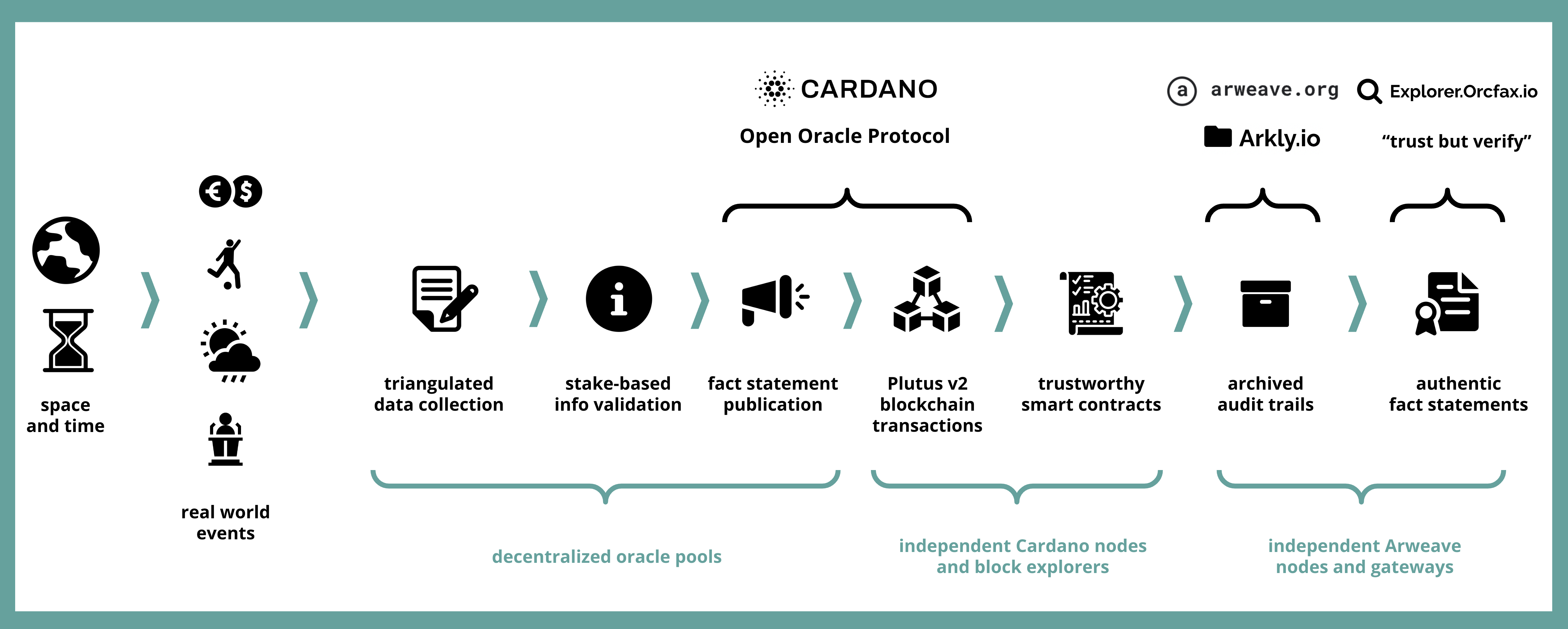Solution overview
Orcfax is an oracle designed to publish trustworthy data to smart contracts on the Cardano blockchain. The oracle's architecture consists of a number of software nodes written predominantly in Python, Haskell, and Plutus v2 code. These Orcfax nodes publish datum about the real world (e.g. the price of ADA in USD) as CBOR-serialized reference inputs into Cardano transactions. These datum are read and used in business logic by smart contracts and scripts.
The subject of this data can be nearly limitless in possibilities, and can include changes in current exchange rates (CER), supply-chain activity, insurance, as well as data on-chain (e.g. the prices of Cardano native tokens or CNTs).

Once published, this data can be used as trustworthy reference inputs to trigger different kinds of business logic in Cardano smart contracts and dApps. All of this data relating to Orcfax workflows (including collection, validation, and publication) is captured within archival packages, which when combined represent complete audit logs of Orcfax processes. These packages are secured through decentralized storage and are made easily accessible through the Orcfax Explorer.
More can be read about the Explorer in the Orcfax Explorer section.
Collection
Most leading oracle platforms are beginning to implement some form of decentralized oracle pools as another technique to address the oracle problem. In its purest form, a decentralized oracle pool uses distributed networking and computation nodes to achieve consensus on the authenticity and accuracy of source data before it is published on-chain.
Unfortunately, most current implementations do not go this far. Instead they often receive data from a single, black box provider. They then use an oracle pool to arrive at a consensus about the uniformity of that data and not necessarily about its authenticity or accuracy.
To address this shortfall found in many other oracle services, Orcfax enforces a strict triangulation policy for all its oracle feeds. This means that the Orcfax solution will collect data from a minimum of three independent sources via a decentralized pool of validator nodes. These data points are then normalized, aggregated, and validated by the nodes before finally being published within a Cardano blockchain transaction via its Plutus V2 eUTXO format.
More on this topic can be found in Data collection.
v1 Orcfax Protocol
The rules for how this data is structure and published is defined through the v1 deployment of the upgraded Orcfax Protocol. Further details can be found in the Orcfax developer manual
The upgraded protocol allows Orcfax to streamline its solutions while also increasing cost efficiency. The Orcfax Protocol was designed as a purpose-built set of software tools and processes to publish datum to the Cardano blockchain.
Publication
After the data has been collected, normalized, and validated, the next step is to publish it on-chain; how publication is executed is largely dependent on the business needs of Orcfax feed integrators and the use cases these feeds enable.
These use cases are wide ranging and innovation in the blockchain space means that new use cases for Orcfax feeds continue to evolve. Because of this, there often isn't a one size fits all solution for how to bring data on-chain. Orcfax recognizes just how dynamic the development landscape and is leveraging ongoing R&D along with integrator feedback in order to meet those changing needs.
One way that Orcfax is addressing varying integrator needs is through the development of options in terms of feed publication models; these models allow integrators to choose a service which meets the needs of their projects.
By adding flexibility to the Orcfax solution, dApps can make business decisions that improve cost efficiency and value to their stakeholders.
More on this topic can be found in Publication models.
Standards & best practice compliance
The Orcfax Team's world class experience with information management technologies and expertise in other related fields has informed solution development at every stage. Orcfax is developing the most comprehensive solution to the oracle problem. This is, at least in part, because Orcfax has been designed as a standards-compliant recordkeeping system that integrates on-chain publication with decentralized data collection, validation, and archival processes.
The Orcfax system requirements were meticulously derived from the extensive analysis and review of blockchain, information technology, and legal standards being utilized within the information management industry. The outputs of this research are managed in a comprehensive requirements knowledge base from which Orcfax has derived system requirements. In addition to these standards and best practices, our team continually reviews existing oracle services in order to maintain a comparative analysis of other oracle services and how those solutions attempt to guarantee the accuracy and authenticity of their data.
Our analysis continues to reveal gaps both in how existing oracle providers conceptualize the oracle problem, and in the efficacy of their attempts to address it. These service providers have broadly ignored industry standards and academic research findings that exist outside of the blockchain industry's echo chamber. Of particular significance are the ISO quality standards that provide well-established international guidelines and practices for ensuring the authenticity and accuracy of digital information– the very thing that oracles should be most concerned with.
Orcfax stands apart from other oracle solutions because it has leveraged relevant multidisciplinary assets in order to inform its development from the ground-up as a standards-compliant digital record-keeping system.
More on this topic can be found in Auditability.
Orcfax beyond DeFi
The oracle problem is not limited to DeFi and its quest to truly decentralized finance; society as a whole is experiencing a "trust crisis". We need better solutions for validating statements of fact about the real world.
Orcfax is responding to that call. Our solution is intentionally designed to leverage the distributed consensus breakthroughs achieved through distributed ledger technologies like blockchain in order to provide decentralized, "trustless" fact validation and reference services; What's more, the Orcfax solution has been intentionally designed to leverage global record keeping and information management standards so that data created through its processes will have many use cases and applications beyond DeFi (e.g. decentralized journalism, AI training, and more).